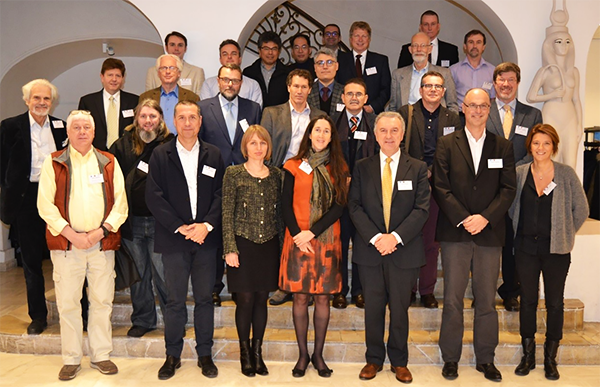![]() New collaboration board for HL-LHC
New collaboration board for HL-LHC
by Isabel Bejar Alonso (CERN) and Panos Charitos (CERN)

The HL-LHC Collaboration Board [HLCB] is the official forum for information exchange and dialogue between the HL-LHC collaborators, HL-LHC project management and CERN management (Image: CERN)
The first session of the new HL-LHC Collaboration Board took place in Paris on 14th November 2016. The HL-LHC project moves from its initial conceptual design phase into the constructive design phase, which marks the beginning of construction for some HL-LHC components.
Moving into the new phase is reflected not only by the change of the composition of the Collaboration Board, but also in the relations with the institutions working for the HL-LHC.
Lucio Rossi, HL-LHC Project Leader points to the increasing number of Member States that contribute through their universities and research centres. Finland, Poland and Sweden have joined, in addition to a strengthened relationship with the States which were already part of the design study, such as France, Italy, Spain and the United Kingdom.
“We are particularly proud of the UK contribution, where not only the number of universities is increasing, but also the domains of competence,” notes Lucio Rossi, HL-LHC Project Leader.
Contributions to HL-LHC are also not limited to Europe. Canada is represented by Triumf laboratory, which is also a new member of the Collaboration Board. The SLAC National Accelerator Laboratory, located in California, joins BNL, LBNL, Fermilab and Old Dominion University (Virginia) in the effort of US contribution. In addition, Asia is represented in the collaboration by Japan, while China may soon join the collaboration.
A new general framework contract based on a multi-party memorandum of understanding (MoU) that allows a more flexible exchange of personnel between partners has been agreed upon. Additional contributions can be added by the laboratories via simple addenda.
Collaboration partners include laboratories and institutes who have either signed directly a HL-LHC collaboration agreement or are part of an overreaching general collaboration agreement, will provide either significant in-kind contributions or studies and personnel for the HL-LHC project.
Institutes that have signed the MoU but do not provide an explicit in-kind contribution to HL-LHC are to be considered observers.
The present HL-LHC Collaboration Board has 21 members and 10 observers and is chaired for the next two years by Robert Appleby from the University of Manchester in the UK.
